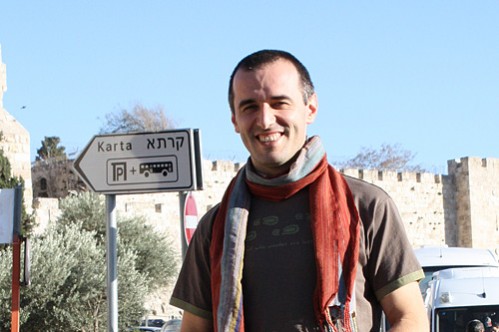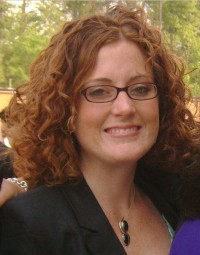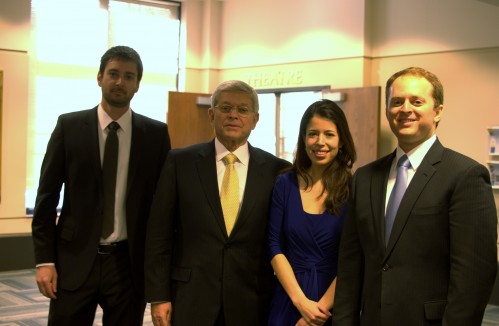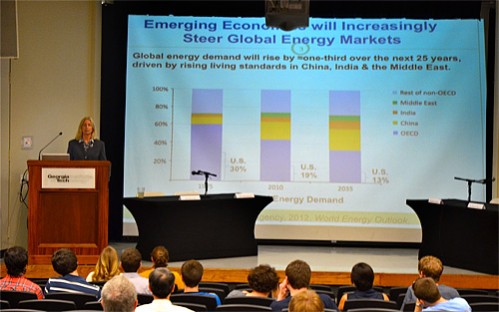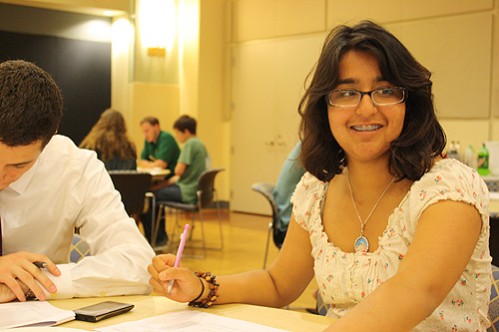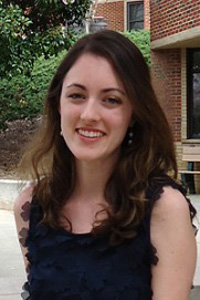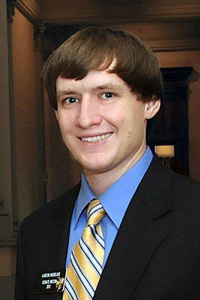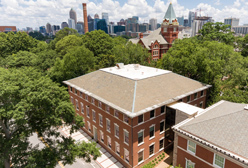New Sponsored Research
Lauren Klein, assistant professor in the School of Literature, Media, and Communication, is the recipient of a prestigious NEH Digital Humanities Start-up Grant. The $59,999 grant funds development of "TOME: Interactive TOpic Model and MEtadata Visualization," a web-based tool for the visual exploration of the themes that recur across an archive, based on the text analysis technique of topic modeling combined with the archive's related metadata. A digitized archive of 19th century abolitionist newspapers will serve as the initial test case.
What Does Georgia Tech Think?
Selected Press for Ivan Allen College of Liberal Arts
|
|
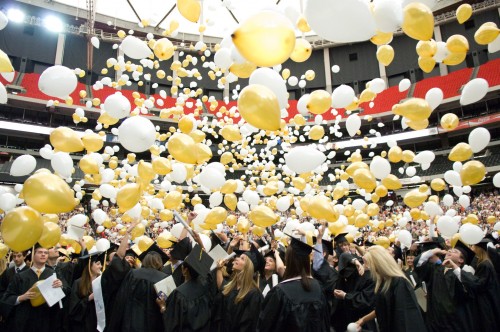
|
Commencement 2013
Congratulations to the one hundred and ninety-one Ivan Allen College of Liberal Arts students who graduated during ceremonies May 3 and 4!
Eleven Ph.D. students, forty-eight master's students, and one hundred and thirty-two undergraduates received degrees in the college. With scrolls in hand, newly minted graduates (below, from left) Ethan Butler, Kristin Byars, Erin Evans, Andres Celedon and Chris Fuga, all from the School of Public Policy, switch the tassels on their mortar boards signifying their status as Georgia Tech IAC degree holders. See the full gallery by The Atlanta Journal-Constitution: http://www.ajc.com/gallery/news/georgia-tech-graduation/g9Ty/#3382423
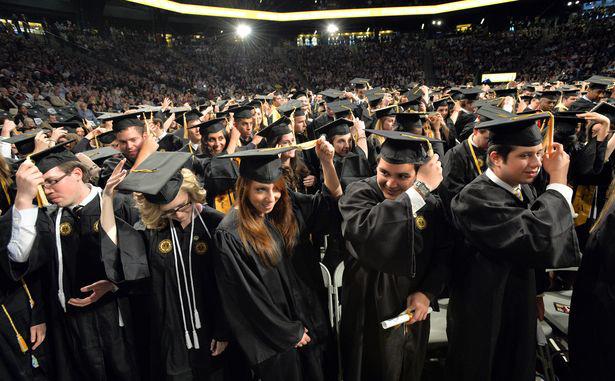
"The emotion that I feel the most is pride. I'm just so proud of everyone who has come to Georgia Tech and who is accomplished and now who is getting out!" said Vett Vandiver (LMC) (below, center). Watch the GT graduation video: http://www.youtube.com/watch?v=1c3fv1pYSak
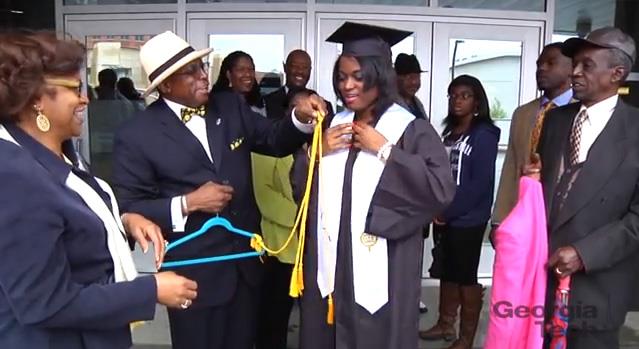
|

|
New Sports, Society, and Technology Program Plays to Georgia Tech’s Home Court Advantage
The impact of sports does not end when the game does. Nutritional supplement use among athletes is hotly contested. Football concussions are making headlines. The economic effect of a new city stadium is generating debate. As technology becomes increasingly integrated with sports, Georgia Tech is positioning its new Sports, Society, and Technology (SST) program to be the source for answers.
“Sports studies programs exist elsewhere. However, none of them has the capacity to engage technology in the way that Georgia Tech can,” said John Tone, acting director of SST and associate dean of undergraduate studies at the Ivan Allen College of Liberal Arts (IAC).
In 2011, Tone discussed the possibilities of sports studies with IAC Dean Jacqueline Royster. The college’s namesake, Ivan Allen Jr., brought professional sports (Braves, Falcons, Hawks, and Atlanta--Fulton County Stadium) to Atlanta as an economic development strategy during his tenure as mayor in the 1960s. The SST program, with its home base in IAC’s School of History, Technology, and Society, honors that legacy.
Since Mayor Allen’s era, sports has blossomed into a $300 billion dollar business, twice the size of the auto industry and seven times larger than the movie business. Furthermore, the future of this massive cultural institution is tied to technology research, a field in which Georgia Tech is a major world player and HTS is ideally situated to coordinate its study.
“HTS prides itself on fostering interdisciplinary research of the highest order and producing graduates capable of engaging the opportunities and challenges faced by human societies in our technologically complex world,” said Steve Usselman, chair of HTS. “The school looks forward to building its expertise in the understudied and vitally important domain of sports and technology.”
The program celebrated its official launch with a panel discussion among faculty from diverse state campuses on “Sports, Society, and Technology in the 21st Century” on April 18 at the Academy of Medicine. The panel discussion was followed by a reception honoring program supporters and celebrating Homer Rice, former Georgia Tech athletic director (1980-1997) and the legend behind SST’s new Homer Rice Chair of Sports and Society.
“HTS is honored that Dr. Homer Rice has entrusted us with nurturing this pioneering initiative into the study of sport and society. His generosity has positioned the school to anchor a truly distinctive program of education and research, one which will ultimately encompass colleagues from across IAC and the entire Georgia Tech community,” said Usselman. “Inspired by the generous leadership and creative vision of Dr. Rice, we stand to make a real difference here at Georgia Tech and in the world at large.”
Tone said the program is unique because of how it capitalizes on Georgia Tech’s research strengths coupled with the “radical interdisciplinary quality of the curriculum.”
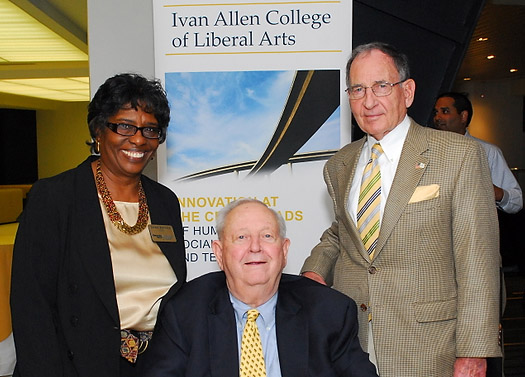
Photo (above): Dean Jacqueline Royster (l) with inaugural SST program supporters J. C. "Bud" Shaw, Sr., Class of '50, and Homer Rice (r) during the SST program reception held at McCammish Pavilion on on April 18.
Below: Homer Rice (far right) was a guest lecturer in Dr. John Smith's History of Sport in America class.
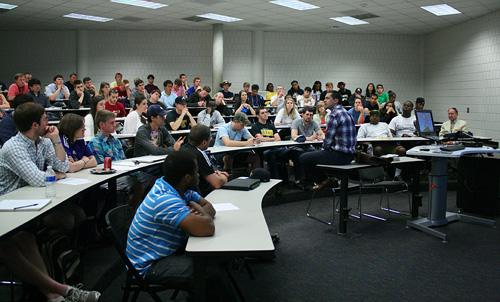
John Smith, a postdoctoral fellow in SST, was hired in the summer of 2012 and has already developed two SST courses, both of which are being offered this semester. One, Foundation of Sports Studies (HTS 3823), is a seminar with guest lectures. The other, History of Sports in America (HTS 2813), exposes students from a variety of majors to the value of sports studies.
Nolan Alexander, a third-year Business Administration major, signed up for History of Sports in America to prepare for a career in broadcasting and said he’s already benefiting from the critical look the class directs at today’s athletes. Jillian Broaddus, a second-year student majoring in Science, Technology, and Culture, took the Foundation of Sport Studies seminar to gain a clearer perspective on life after graduation.
“We had equipment engineers, data analysts, past agents, sports psychologists, and others give lectures over the course of the semester” said Broaddus. “Getting the opportunity to talk one-on-one with people who have already succeeded in these areas helped me focus on what I really want for the future.”
In the coming years, the program hopes to expand to allow students to minor or major in SST and possibly offer a graduate certificate. For now, the classes give students a rich perspective and preparation for work in the sports industry and shine a spotlight on the preeminent faculty research ongoing in sports studies.
“Sports is not just about winners, losers, champions, and trivia. We can use it as a lens to discuss larger issues such as race, ethnicity, politics, and globalization,” said Smith. “Georgia Tech is an institution that prides itself on engaging the world, and the SST program is a pivotal way to do that.”
|
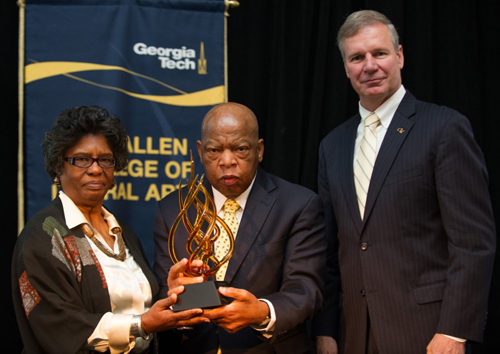
|
An Unflinching Advocate for Civil Rights: John Lewis Receives the Ivan Allen Jr. Prize for Social Courage
The Ivan Allen College of Liberal Arts honored civil rights icon and Congressman John Lewis with its Ivan Allen Jr. Prize for Social Courage. The award, presented April 4 in Atlanta, is given annually to individuals who, by asserting moral principle, positively affected public discourse at the risk of their careers, livelihoods and, sometimes, even their lives. The day marked the 45th anniversary of the assassination of Dr. Martin Luther King Jr.
“Congressman Lewis made his mind up to accomplish many things throughout his lifetime, and his accomplishments will transcend generations,” said Georgia Tech President G.P. “Bud” Peterson. “He has dedicated his life to protecting human rights, securing civil liberties, and building what he calls ‘The Beloved Community’ in America. His unflinching civil rights leadership and ongoing advocacy for social change throughout his career have elevated the cause of human rights around the world.”
Lewis became known around the world at the age of 25 following the “Bloody Sunday” beatings of peaceful protesters in Selma, Alabama, in March of 1965. Lewis called on President Lyndon Johnson for federal intervention, turning public opinion against those trying to maintain the old social order of the South. President Johnson would soon present to Congress what would become the Voting Rights Act.
“I always did what I could do to help other people,” Lewis said at the ceremony while reflecting on his role in the civil rights movement. “I wanted to make a difference in order to meet the pressing need of people left out or left behind. I was inspired to find a way to a ‘new way.’ And this inspires me today, as I continue to keep pushing on.”
Lewis was one of the “Big Six” leaders of the Civil Rights Movement. He is the last surviving keynote speaker from the 1963 March on Washington, of which he was a core architect.
Lewis’s impact on civil rights for African-Americans included advocating desegregation laws and voters’ rights. A founding member and president of the Student Nonviolent Coordinating Committee (SNCC), Lewis planned and led many of their activities. His personal courage was first evident when he led student sit-ins that resulted in the public accommodation of African-Americans at Nashville restaurants. He was one of the original 13 Freedom Riders who challenged legally sanctioned segregation on interstate buses. Despite repeated attacks on his dignity, physical beatings, and arrests, Lewis remained staunchly committed to nonviolent work for social change.
The day’s events included panel discussions and congratulatory messages from Presidents Jimmy Carter and Bill Clinton.
“Today’s theme, ‘Building Communities of Trust,’ highlights crucial components of our mission at Georgia Tech to improve the human condition,” said Jacqueline J. Royster, dean of the Ivan Allen College. “If we have learned anything from the technological terrors and triumphs of the last century, it is that human-centered and societally centered concerns must be a foundation for our problem solving, innovation, and entrepreneurship.”
The Ivan Allen Jr. Prize for Social Courage is named after Allen, a former mayor of Atlanta and Georgia Tech graduate. In 1963, Mayor Allen testified before Congress in support of what would become the Civil Rights Act of 1964, risking his place in society and political future. Prior winners include Sam Nunn and William Foege. The Prize is supported in perpetuity through a commitment by the Wilbur and Hilda Glenn Family Foundation.
Related Links:
|
Africa Atlanta 2014 Debuts at Georgia Tech African Film Festival
|
|
|
|
Africa Atlanta 2014 made its official debut on the occasion of the Georgia Institute of Technology African Film Series premiere on April 2, 2013, at the Historic Academy of Medicine. The event began with a reception at 6:00 p.m. and included a screening of the acclaimed film Life on Earth (France, Mali, Mauritania, 1998) by Abderrahmane Sissako, with a special introduction by African Film Scholar, Aboubakar Sanogo of Carlton University in Ottawa, Canada. A discussion with Sanogo, Jacqueline J. Royster, dean of the Ivan Allen College of Liberal Arts, and Angela Dalle Vacche, professor in the School of Literature, Media, and Communication at Georgia Tech immediately followed the film. Modeled on the highly successful France-Atlanta Initiative, Africa Atlanta 2014 is a citywide, year-long celebration of cultural and economic bonds among African, European, and American cultures in Atlanta. It has been organized by the Ivan Allen College of Liberal Arts at the Georgia Institute of Technology in collaboration with the Consulate General of Belgium in Atlanta. This initiative, designed as a robust cross-cultural interdisciplinary collaboration of multiple stakeholders across the City of Atlanta, is anchored by the art exhibition, KONGO across the WATERS, which is co-curated by the Royal Museum of Central Africa in Tervuren, Belgium, and the Samuel P. Harn Museum of Art at the University of Florida. The exhibition will be at the Jimmy Carter Library and Museum from May until September 2014. Before, during, and after the exhibition an exciting range of complementary events organized by partners across the city and the region offer a variety of activities related to the African-European-American experience. The activities will highlight the arts and humanities; science and technology; enterprise and innovation; and education and public engagement. |
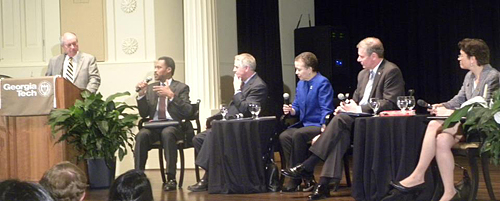
|
On Compassion in Science and Technology: Georgia Tech Hosts Discussion among Five University Presidents
Image courtesy Morehouse College.
A remarkable dialog among five Atlanta university presidents took place on campus April 24 when Georgia Tech President G. P. “Bud” Peterson hosted “A Conversation among Presidents: Compassion in Science and Technology” at the Historic Academy of Medicine.
The topic continued a dialog originating with the 2012 Ivan Allen Jr. Prize and Symposium which honored Dr. William Foege, a renowned epidemiologist and global champion of compassion in science. It also complemented the freshman reading assignment, The Immortal Life of Henrietta Lacks which explored science, ethics, and race.
"Ethics and compassion cannot be separated from science and technology. The driving force behind the discoveries in science and the applications in engineering and technology is the need to improve the human condition," said Peterson. "The challenge, and the commitment needed, is to do the right thing, regardless. Ethics has been compared to tennis - either it is in or it is out. While there are many hard decisions along the way about which choice is the most ethical, a good leader’s decision should never be whether or not to remain ethical."
Initiated at the behest of President Peterson, organization of the panel was headed by Dr. Kenneth Knoespel, Director of the Ivan Allen Institute for Advanced Studies, Ivan Allen College. Joining Dr. Peterson were Presidents Elizabeth Kiss of Agnes Scott College, Beverly Daniel Tatum of Spelman College, James W. Wagner of Emory University and John Silvanus Wilson, Jr. of Morehouse College.
All five presidents agreed that compassion is a quality they are working to successfully incorporate into their respective campus cultures. Moderated by Scheller College of Business Professor Bill Todd, the discussion ranged across science, race, ethics, social courage, and the importance of social compassion in every campus culture.
“Perhaps a lack of courage stems from a lack of compassion,” said Todd.
The event was open to faculty, staff, parents, and students.
“This was such an awesome and incredible event,” said Eran Mordel, past president of Georgia Tech’s Student Government Association. “It’s very rare that you have five intelligent, creative and knowledgeable education leaders in one room, on one stage. The conversation was captivating, and I was inspired by so many statements made by the presidents.”
Related Links:
|

|
Should We Outlaw Wearing Google Glass While Driving?
Google's Glass is not even available to the general public yet, but a West Virginia lawmaker is already taking steps to ban the wearable device for people behind the wheel. Glass, which could be on the market by the end of the year, is a device that sits on the face like a pair of sunglasses. It promises to provide information, images, and video from the internet. Robert Rosenberger, assistant professor in the School of Public Policy, weighs the pros and cons of the technology and its potential effects on driving.
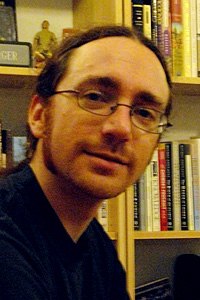 "Considering all that cognitive science has learned over the past decade about the dangers of using the phone while driving, it seems like a good idea to be cautious about equipping drivers with any new technology that might distract from the task of paying attention to the road. And since Google Glass will have features that include a display of images in the upper corner of the wearer’s vision, the potential for distraction is high. "Considering all that cognitive science has learned over the past decade about the dangers of using the phone while driving, it seems like a good idea to be cautious about equipping drivers with any new technology that might distract from the task of paying attention to the road. And since Google Glass will have features that include a display of images in the upper corner of the wearer’s vision, the potential for distraction is high.
"A consistent finding in the empirical research on cell phones and driving is that it is not only handheld phones, but also hands-free phone conversation, that is associated with a dangerous level of driving impairment. An important takeaway here is that drivers can be distracted by technology usage even when they stare uninterruptedly out the windshield and keep both hands on the wheel—as when they’re distracted by hands-free phones. So even though a Google Glass wearer would continue to look forward out at the road and use a hands-free voice command interface, the act of interacting with other people over the Internet through the device could still result in a dangerous level of distraction.
"It is important not to confuse this proposed ban with laws intended to protect people from themselves, like seatbelt or helmet laws. Representative Howell is right to point out that regulations on the use of communications and Internet devices are intended to protect not only the driver herself or himself, but other drivers and pedestrians.
"Critics suggest that it is narrow-minded and presumptuous to attempt to ban a product before it has even become available to the public, and before we know exactly what it is capable of and how it will be used. I disagree. If anything, our approach to the regulation of cell phone technologies thus far has been highly reactive, rather than proactive. Our laws on these issues always seem to be two steps behind the current technology. For example, it remains unclear whether the bans that many states hold on texting while driving apply to the increasingly pervasive hands-free modes of texting. So it is important to get out in front of this issue, and now is the time to start considering the safety implications of new technologies that will present complex information across our visual field.
"What complicates the case, however, is that there are surely applications of Google-Glass-style technology that could be helpful to drivers. For example, the display generated by any legal technology, from radio information to GPS directions, might be more safely presented through a heads up readout than through a dashboard-mounted screen.
"But if some uses of wearable head-mounted technologies are allowed and not others, then enforcement becomes a problem. As we’ve found with texting bans, it can be very difficult for police officers to enforce these laws since drivers remain allowed to type into and look at their handheld phones for other reasons (such as entering a phone number into the keypad to place a call). The outlaw of all handheld phone usage has proven to be much easier to enforce since police can simply pull over anyone caught holding a phone at all. A solution might be the separation of the driving benefits of wearable Internet technologies from those devices themselves. If, say, GPS applications benefit from a heads up display, then new technologies can be developed which provide this function without relying on wearable tech (with devices instead perhaps built into the dashboard or windshield). This way the wearable device, complete with its dangerously distracting features, can be outlawed for drivers in a way that police can actually enforce."
This piece was reprinted from Amplifier, a Georgia Tech blog, and can be viewed here.
|
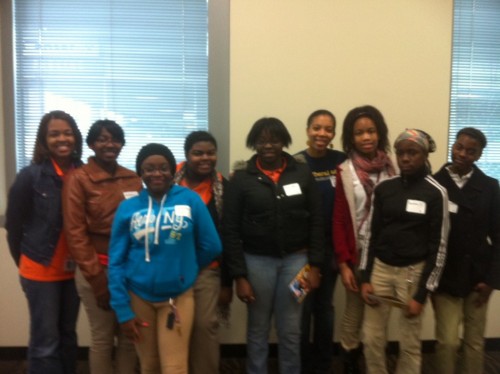
|
Westside Stories: Eighth Graders Explore What Its Like to Attend Georgia Tech
On Friday February 22, forty-six eighth-grade girls from Joseph Emerson Brown and John F. Kennedy middle schools in the West End and Vine City neighborhoods got a taste of college life at Georgia Tech. The event was part of IAC's Westside Communities Initiative which is connecting people and organizations across the Institute and across Atlanta to create sustainable solutions and foster points of unity.
The event was part of IAC's Westside Communities Initiative which is connecting people and organizations across the Institute and across Atlanta to create sustainable solutions and foster points of unity. It was organized by Sheri Davis-Faulkner, IAC Westside Communities Liaison, and master's candidate Mackenzie Madden from the College of Architecture in partnership with InGirls, an organization focused on increasing college acceptance among underserved female students.
The girls were welcomed to campus by undergraduate students Danielle Sharpe and Cecili Reid and Ph.D. candidate Nettrice Gaskins who sent them off in small groups for various activities. Some attended classes in the schools of Economics and Literature, Media, and Communication (LMC). Others attended demonstrations of robotics, public participation, and augmented reality in the GVU Center, while others visited the EarSketch recording studio, a joint project of LMC Associate Professor Brian Magerko and the College of Architecture School of Music. Lunch was held in the Presidential Suite of the Bill Moore Student Success Center overlooking the football stadium. Chris Briggs, from the Office of Admissions highlighted the benefits of stuyding at Georgia Tech and how students can prepare for admittance.
Volunteers from the IAC Student Ambassadors, IAC Student Advisory Board, Delta Sigma Theta, FirstGen, JumpStart, OMED, and the courses NearPeer and Science, Technology & Race then took the girls on informal tours of campus with opportunities to ask questions. Stops along the way included Tech Rec and the Campus Recreation Center. Several of the volunteers provided their contact information to the girls in order to continue serving as a liaison to Georgia Tech.
"The girls left excited about the prospect of attending Georgia Tech, something that may have seemed unattainable before this visit and a short term goal of the program," said MacKenzie Madden. "We look forward to an ongoing relationship with the InGirls program to ultimately increase acceptance and admittance to Georgia Tech from our neighboring communities."
|
Wesley Center Donor Honored by Engineering
James and Mary Wesley, benefactors of the James and Mary Wesley Center for New Media Education and Research in the IAC School of Literature, Media and Communication, were inducted into the Georgia Tech College of Engineering Hall of Fame this month.
The Wesleys established an endowment fund for the benefit the Department of Biomedical Engineering. Their support of the Wesley Center in LMC makes possible the application and development of new media technologies in the areas of education, design, digital art, and culture, and it encourages work in film, television, expression of art and literary forms - all of which are now in a cultural dialogue with new digital media.
|
Pearson named AAAS "40 @ 40" Featured Fellow
|
|
Willie Pearson, professor in the School of History, Technology, and Society, has been named a featured fellow in the American Association for the Advancement of Science's (AAAS) celebration of the 40th anniversary of its Science & Technology Policy Fellowship. To commemorate 40 years of Science & Technology Policy Fellowships, AAAS launched a 40 @ 40 initiative. Forty former fellows were selected from the more than 2,600 who have received fellowships. Pearson was selected as the representative for the class of 1988-89. His biography and a short audio interview will be featured on the AAAS website, and he will be honored at a commemoration event on May 3. The Science & Technology Policy Fellowships were created to provide scientists and engineers an opportunity to utilize their scientific knowledge and expertise to inform and support policy-makers. |
LMC Lecturer Richards Awarded Fulbright
Paulette Richards, a former Brittain Fellow in the School of Literature, Media, and Communication and current lecturer with the Writing and Communication Program, has been awarded a Fulbright to teach in Senegal.
Richards will teach American and African American literature during the 2013-2014 academic year. Her courses and development of a literary salon will introduce Senegalese students to the black writers of the Nommo Literary Society, who met regularly in New Orleans from 1999-2005.
“Two thousand of the first three thousand Africans brought to the Louisiana colony came from Senegal, so in a sense I am returning the cultural legacy of New Orleans to its source,” said Richards.
Developing international understanding requires a commitment on the part of Fulbright grantees to establish open communication and long-term cooperative relationships. In that way, Fulbright recipients like Richards enrich the educational, political, economic, social, and cultural lives of countries around the world.
|

|
MOOCs: Rediscovering the Material World
T. Hugh Crawford, associate professor in the School of Literature, Media, and Communication, offers his thoughts on the development of Massive Online Open Courses (MOOCs). Photo courtesy Keith Negel for The Chronicle.
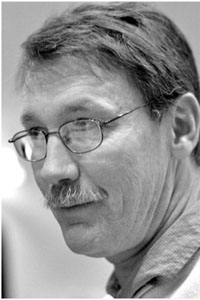 While I was hiking the Appalachian Trail this past summer, Georgia Tech, my home institution, announced its affiliation with Coursera and launched itself headlong into the MOOC world. While I was hiking the Appalachian Trail this past summer, Georgia Tech, my home institution, announced its affiliation with Coursera and launched itself headlong into the MOOC world.
It occurred to me as I ambled down the trail that day that an intensely embodied experience like long-distance hiking seemed the opposite of long-distance education. Hiking requires taking not only a careful equipment inventory, but also a constant inventory of your own body: checking hydration, sore muscles, arthritic knees, blisters, and an always-too-heavy pack.
I realized that to MOOC or not to MOOC was not really the question. The real issue was how brick-and-mortar institutions could embrace MOOCs while continuing to build on the strengths of local, capital-intensive pedagogical practices—actual in-the-flesh pedagogy in a world of Coursera.
In the months before this announcement, a Georgia Tech faculty panel had, as a result of a strategic-planning process, decided to focus on a number of undergraduate initiatives that included design pedagogy. Design, like MOOCs, is a hot pedagogical term these days. Once designating a fairly narrow set of material practices, design has come to embrace a broad range of activities, including interactive, game, and even lifestyle design.
Although it does take advantage of the Internet to collaborate at a distance, most design practice involves small, tightly organized teams grappling not just with ideas but also with the physical materials necessary to execute them. So perhaps thinking about the use of design to teach—any subject, including literature—is a way to begin to understand what MOOCs might be missing.
In the fall of 2009, I taught an upper-level seminar on Thoreau. The students, who came from a broad range of disciplines, were asked to read Walden before the semester began, and on the first day I set them two tasks: to collectively timber-frame a replica of his house using only the tools he could have used (no power tools), and to document the process through text, video, and Web-based materials.
Although there are many renderings of Thoreau's famous house, no true plans for its construction exist—only the scattered passages in Thoreau's book, a drawing by his sister, and the conjecture of a number of scholars—so my students first had to design their frame. But before that, they had to understand timber-framing as a practice. And before that, they had to understand 19th-century hand tools and then borrow some axes to cut down some trees.
In other words, they had to develop a number of design skills, articulate a building plan (which would also deal with safety issues), form documentary strategies, and, ultimately, learn how to swing an ax and mortise a joint. We spent the next few months studying the history of building practices, reviewing literature on the relationship between cognition and tool use, and, of course, rereading Thoreau. We also spent a lot of time chopping, sawing, chiseling, and documenting, and we spent time learning that we needed to learn yet another set of skills. The semester ended, grades were assigned—and the work continued.
Our frame was raised the following February by students in the course and volunteers who had joined us over the months. The students ended up with a timber structure, blisters, and a few adze-related wounds, as well as research papers, video interviews, poster sessions, a short documentary film, and presentations at two scholarly conferences.
This experience highlights the value of design-intensive pedagogy. Those students had to design a house but also a syllabus, a research strategy, and various forms of public presentation. Nothing was given; everything was a problem awaiting a solution. It goes without saying that you cannot square a timber with a broadax via the Internet—YouTube videos notwithstanding. The results of their research can be downloaded all over the world, but the class as a practicing design team was resolutely local—fixed and weighted in the front yard of Georgia Tech's Architecture School building.
As pedagogy, the work of the "Thoreau Housing Collective" extended across the institution, as we were joined by volunteers, many of whom just wanted to get their hands dirty. We also conducted impromptu lectures and demonstrations for curious passers-by. Building the house was hard work, but so is design-oriented pedagogy. The Thoreau we came to know demanded a constantly redesigned set of processes that were usually determined by a confrontation of minds, hands, tools, and materials.
So a few summers later, after that long day hiking on the trail, I made camp, pulled out my iPhone, and thought about Coursera, pedagogy, and my institution. My aching body provided some perspective.
As I wandered around the Web for information about Coursera and MOOCs, it was clear to me that a great deal of learning can and obviously does take place online, but what brick-and-mortar classrooms still provide is that moment when people confront a problem in the same local space. We learned Thoreau not just by reading what he wrote but also by doing what he did, and that made all the difference.
Maybe next time, I'll teach a class about bricks and mortar.
This op-ed was originally published in The Chronicle of Higher Education. Read the full piece here.
|
Economics Alumnus Finds the Story in the Numbers
|
|
|
|
Valentin Todorov had migrated to the United States from Bulgaria, learned two languages, and received a degree in mechanical engineering (ME) as well as an Master of Business Administration (MBA), but his first semester as a Master’s student at the IAC School of Economics was nearly too much for him to handle. “I thought about quitting the first semester,” said Todorov. “I wouldn’t say there was anything easy about going into the economics program.” Todorov was born in Bulgaria and studied mechanical engineering before coming to the United States ten years ago. His cousin is a professor at the University of West Georgia (UWG), making Atlanta a natural choice to start a new life. Todorov graduated with an MBA from the UWG in 2005, but felt the urge to narrow his focus of study further. “I wanted to study a more quantitative discipline,” said Todorov, and “graduate to work in an exciting field.” He was looking to delve into numbers with a scientific approach like his ME degree and a social application like his MBA. The School of Economics, recommended to him by a friend, was the perfect academic blend. He emailed the program director and received a prompt response. “The director said, ‘Sure, come on over!’” recalled Todorov. “I got a warm reception when talking to professors in the program.” They may have been friendly, but Todorov quickly discovered their high expectations for him once he began classes. He soldiered through that first semester, knowing he could not come so far only to fall short. “I don’t quit whatever I start,” said Todorov. “I came here [to the United States] as an international student. When you come, you’re really determined to change your life. Once you leave, there is really no going back.” Todorov pushed through the first semester, found his stride, and graduated in 2007. After spending a few months as a stockbroker intern for Scottrade, he began work as a statistician for Assurant and became a statistical consultant at Equifax in March. He credits his success in data forecasting to knowledge gained in the economics program. “A lot of the tools I learned at Georgia Tech,” said Todorov. Once students gain a familiarity with the basics, he encourages them to move beyond tools to develop storytelling skills to capture audiences. “It’s good to know the tools. It’s good to know how to crunch numbers,” he said. “But people are interested in your stories, and crunching numbers is just one way to get them.” He says his job is to tell stories with numbers. He spent his three years at Assurant looking at the daily performance of mortgage data and reporting that data to the upper management. “What I do is say, forget all the tens of millions of records. Here’s what’s important,” he said. Being able to choose the right statistical method and the best data visualization type is imperative to clearly communicate the message in the numbers. The daily challenge to do just that keeps Todorov going. “When you’ve found your calling, that’s what matters,” he said. “You have to find something that makes you want to wake up in the morning and go to work.” For Todorov, that motivation stems from a long journey to a new world filled with numbers, all quietly waiting for their stories to be told. |
Public Policy Alumnae is one of Raleigh-Durham's '40 Under 40' Top Leaders
|
|
Emily Atkinson, a 2005 alumnae of the School of Public Policy, was selected as one of the Triangle Business Journal's 40 Under 40 Class of 2013 Leadership Award winners. Atkinson serves as the Vice President of Government Affairs in the Greater Raleigh Chamber of Commerce and previously was a member of the government affairs team at Capstrat. The list was culled from more than 300 nominations. Atkinson will be profiled in the Journal and honored at a luncheon in May. Source: Triangle Business Journal, March 26, 2013 |
INTA Investigates Challenges of Mass Transit
|
|
|
|
Dr. Ing. Raul Delgado Sayan, president of the CESEL S.A. engineering firm in Peru, was the guest speaker at an event on mass transit organized by Moraima Guzman-Bambaren and Nick Varner, graduate students in The Sam Nunn School of International Affairs. The event was held March 27 in the Bill Moore Student Success Center. Sayan was instrumental in developing the plans for a mass transit system currently under construction and partially in operation in Lima. He is also spearheading an initiative to involve Georgia Tech in projects in his country, which is experiencing strong economic growth and directing significant investment towards infrastructure and long-range educational opportunities that will serve a knowledge-based economy. The event, titled "Challenges in Developing Mass Transit," included a presentation by Dr. Catherine Ross of the College of Architecture. Attendees discussed different challenges city planners, policy makers, and engineers face in developing mass transit in the cities of Atlanta, GA, and Lima, Peru. The event drew particular focus to different possibilities and challenges that policy makers face due to different patterns of population and economic growth in the two locations. The Sam Nunn School of International Affairs, with the support of the School of Civil and Environmental Engineering, the College of Engineering, the Office of Development, and the Center for Quality Growth and Development, sponsored Sayan's visit.
|
Sustainability Forum Panelists Advocate for Rethinking Energy
|
|
|
|
Marilyn Brown, professor in the School of Public Policy (SPP), was the keynote speaker at the Spring Sustainability Forum, organized by the Student Government Association's Sustainability Committee and held on April 25, 2013, in the Student Center Theater. The committee is chaired by Mary Shoemaker, an SPP student. Brown, who serves on the International Panel on Climate Change, said that climate change is not simply going to be solved by big fixes in the power generation sector through renewable energy, but by significant strides in energy efficiency. Many smaller efficiency upgrades can yield significant environmental and fiscal benefits; however, people often use more energy in these instances, creating a rebound effect. A panel followed Brown's talk. Panelists included: - Miroslav Begovic, professor in the School of Electrical and Computer Engineering
- Kim Cobb, associate professor in the School of Earth and Atmospheric Sciences
- John Crittenden, director of the Brook Bryers Institute for Sustainable Systems and professor in the School of Civil and Environmental Engineering
- Erik Johnson, assistant professor in the School of Economics
The panel discussed the falling costs of electricity generated through alternative means—such as solar—and the methods by which the public and private sectors can promote investment in these energy sources. The event gave attendees an understanding of the many developments in the renewable energy sector moving toward a carbon-free future, as well as the impediments that must be overcome to achieve this goal. SGA representatives Mary Shoemaker and Nathan Sacks contributed to this report. |
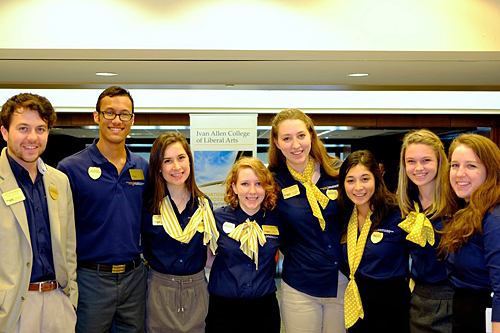
|
"Shadow Day" Gives Prospective Students Insight into IAC
IAC hosted more than 200 prospective and admitted students and parents on campus for Shadow Day April 4. Our guests came from locales as far flung as California, New Hampshire, and Jamaica.
IAC Student Ambassadors (pictured above) provided personalized campus tours and guided attendees as they visited classes and talked with current students about study abroad experiences.
Related Links
|
Students Take on the Fiscal Pressure of Balancing the Federal Budget
|
|
|
|
On April 17th, students took a break from their busy schedules to try on a new hat: member of Congress with an assignment to reduce the national debt, and do it in two hours. The cross-campus federal budget balancing event was organized by Aaron Hoodin, an International Affairs and Modern Languages major and a member of the Ivan Allen College Student Advisory Board, and was co-sponsored by the Concord Coalition, a nonpartisan fiscal policy group co-chaired by Sam Nunn, distinguished professor in The Sam Nunn School of International Affairs. Students were randomly divided and given a brief rundown on the process and the current debt situation. Then they went to work on the problem that has stymied Congress for years. Most groups were able to reduce the debt by about a billion. Rose Anthony, an International Affairs major and a 2012-2013 IAC Dean's Scholar, shared her thoughts on the trials of balancing the federal budget. "From talking to people after the event, it was clearly a success. Most told me that they usually don’t have much fun learning about current events, but being able to discuss it with other people helped tremendously. One student said, 'It was fun and engaging. I surprisingly learned a lot in two hours.'” "I had the pleasure of attending this event previously, and I can say that each time is a new experience. Comparing my old booklet to the new one, I was able to see that many of my decisions had changed dramatically. Seeing this put things in perspective because not only do our representatives have to deal with their own shifting ideals, but also those of society." |
IAC Students Receive Possible Woman Foundation International Scholarships
Katie Ledbetter (pictured on right), a History, Technology, and Society (HTS) major, and Binita Patel, an International Affairs and Modern Languages major, are recipients of Possible Woman Foundation International Scholarships.
Ledbetter was nominated by Amy D'Unger, associate director of undergraduate studies at HTS. Patel was nominated by Stephanie Jackson, assistant director of Undergraduate Advising & Professional Development in The Sam Nunn School of International Affairs.
Both students were honored at the Possible Woman Foundation Spring Gala. The foundation provides scholarships for women to pursue nontraditional roles or occupations and to connect them with women trailblazers in these industries. PWFI presented its first scholarships in 2010.
Related Links
|
Public Policy Student Makes Life-saving Donation
|
|
When Aaron Morgan took a break from his semester-long stint as a Georgia legislative aide to fly to Nashville earlier this year, he wasn’t going for a vacation. He was going to save a life. Morgan, a student in the School of Public Policy who is currently interning at the Georgia State Senate, was informed in January that his bone marrow was a match for a 68-year-old Nashville woman with Acute Lymphoblastic Leukemia. He had been on the Be the Match bone marrow registry for more than four years. Chances of ever being selected are low. “I immediately made the decision to donate. It was never really an option not to,” said Morgan. He sought the permission of his “extremely supportive” boss, a state senator, to leave work early a few days for testing. A few X-rays, a couple of shots (to boost his stem cell count), and one flight to Nashville later, Morgan made what he said was a surprisingly easy donation. “It was honestly one of the coolest experiences I’ve ever had,” said Morgan. “It really makes you stop and think about all the little things you do during the day and the impact that they might have on others.” Morgan will be able to connect with the recipient of his donation in one year, if the recipient so chooses. His internship is part of Georgia's Legislative Internship Program. |
From Witness to Action: Founder's Day Research Panels Showcase Our Legacy of Social Justice
Missed the chance to catch our faculty and student panels at Founder's Day in March? Videos from the event are now available. Below, Dean Royster opens the Founder's Day celebrations. For videos of the faculty and student panel, visit our Founder's Day video archive.
|
|
















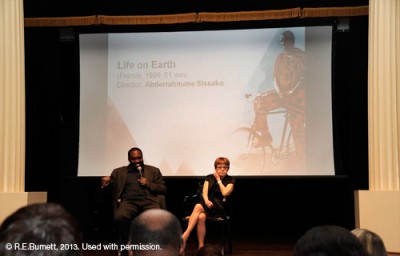


 "Considering all that cognitive science has learned over the past decade about the dangers of using the phone while driving, it seems like a good idea to be cautious about equipping drivers with any new technology that might distract from the task of paying attention to the road. And since Google Glass will have features that include a display of images in the upper corner of the wearer’s vision, the potential for distraction is high.
"Considering all that cognitive science has learned over the past decade about the dangers of using the phone while driving, it seems like a good idea to be cautious about equipping drivers with any new technology that might distract from the task of paying attention to the road. And since Google Glass will have features that include a display of images in the upper corner of the wearer’s vision, the potential for distraction is high.
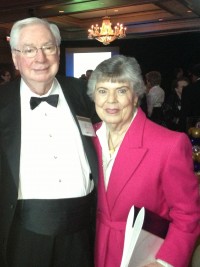
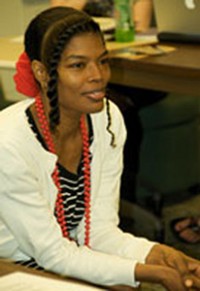

 While I was hiking the Appalachian Trail this past summer, Georgia Tech, my home institution, announced its affiliation with Coursera and launched itself headlong into the MOOC world.
While I was hiking the Appalachian Trail this past summer, Georgia Tech, my home institution, announced its affiliation with Coursera and launched itself headlong into the MOOC world.